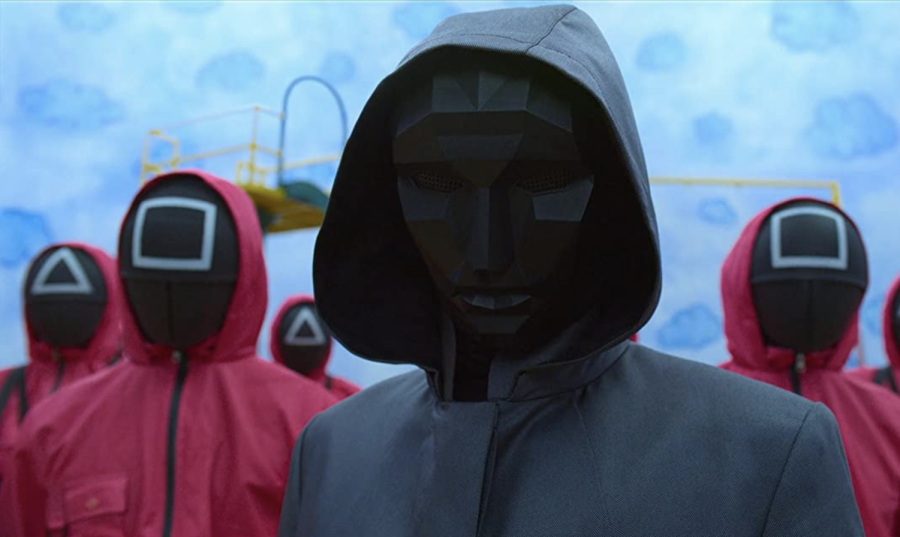Opinion | ‘Squid Game’ revives conversation on subtitles
A still from the Netflix series “Squid Games” is shown above. Columnist Rayna Wuh agrees that the show has issues with subtitle translations, yet it is still able to tell a meaningful story.
Oct 18, 2021
The Korean survival drama “Squid Game” is on track to become Netflix’s most streamed original series, ranking number 1 on the service in at least 90 different countries. The show’s increasing popularity opened discussions about how to maintain the integrity and message of the script when translating it from the original language.
“Squid Game” is subtitled in 31 languages and dubbed in another 13, allowing larger audiences to enjoy the series without understanding Korean. However, some multilingual Korean speakers have raised issues with the English subtitles and closed captioning.
Korean American Youngmi Mayer expressed her frustration with the English subtitles on social media, articulating that essential elements of the show’s characters and message were lost in the process of translation.
She explains that seemingly small details drastically alter the meanings of the dialogue. Mayer raises an example where wording choices undermined the purpose for one particular character, Han Mi-nyeo, to be in the show at all.
In one exchange, Mi-nyeo tries to persuade other players to work with her. According to the captions, she insists “I’m not a genius, but I still got it worked out.” Mayer suggests that a more accurate translation would be, “I am very smart, I just never got a chance to study,” aligning with a common Korean media trope about people who are clever and smart but lack wealth.
Get The Daily Illini in your inbox!
Although her criticisms are valid, translation is exceedingly difficult and underappreciated work. Translators are tasked with preserving cultural references, while also maintaining the clarity necessary for viewers to follow the plot. This undertaking is especially challenging when the words necessary to convey a certain cultural nuance do not exist in the other language.
I am not at all proficient in Korean, but I am fluent in English and Japanese and know functional Mandarin. Even though I am the most fluent in English, there are times when I can only think of particular words in my other languages and fail to pin down their exact meanings in English.
The syntax of sentences also differs greatly between these languages. In contrast with English, which is a subject-verb-object language, Japanese and Mandarin verbs come at the end of sentences. These small differences may seem insignificant, but in reality, they are indicative of the different ways people communicate in their cultures.
There are even further challenges for translators of media. As translation scholar and professor Denise Kripper articulates in an NPR interview, translators have limits on the number of lines and characters they can use. Thus, they must account for the different structures and metaphors of languages and convey messages without confusing viewers — all within a limited space and with limited time. The volume of content to translate for shows like “Squid Game” is also vast, and there is not enough space to explain every detail.
One of the games played by contestants in the show was translated as the easily recognizable children’s game “Red Light, Green Light” in English. This term differs from the direct translation.
Instead of “red light” and “green light” the facilitator of the game, a terrifying animatronic doll, says “mugunghwa kkoci pieot seumnida.” This phrase translates to “hibiscus flower has bloomed.” The direct translation would have been more true to the original, but the same idiom does not exist in English, and it makes sense that the detail was omitted for the sake of clarity.
Translation is an art form, and I appreciate the thought put into the decisions that must be made for each individual line. While there is always room for improvement, overall, the translations in “Squid Game” are able to capture a highly compelling and meaningful story. For all of the cultural nuances lost in translation, there are many more that still shine through.
As Bong Joon Ho, the director of “Parasite” emphasized in his Academy Award acceptance speech, “Once you overcome the one-inch-tall barrier of subtitles, you will be introduced to so many more amazing films.” There is a world full of meaningful stories and media. Translations do the work of making these glimpses into other cultures accessible to all of us.
Rayna is a sophomore in LAS.






